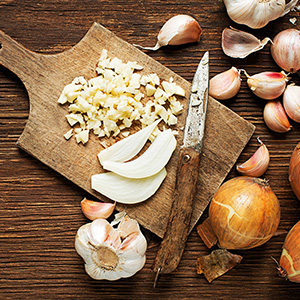Get Easy Health Digest™ in your inbox and don’t miss a thing when you subscribe today. Plus, get the free bonus report, Mother Nature’s Tips, Tricks and Remedies for Cholesterol, Blood Pressure & Blood Sugar as my way of saying welcome to the community!
8 foods most likely to trigger diarrhea

I have a sensitive gut. Fairly often, I’ll eat something and have a stomach reaction…
Like the time I ate greasy carnival food against my better judgment.
But I’ve also eaten something seemingly healthy (like a kale salad) that caused me quite a bit of gastrointestinal distress… or something I’ve eaten a million times without a problem (like a dish at my favorite Thai restaurant) suddenly sends my stomach into fits.
Now, my gut is somewhat out of whack thanks to some long-term antibiotics I took several years ago… but there are some surprising things about (and in) some foods that can trigger an urgent bathroom run even in those among us with an iron stomach.
That’s why I’d like to share eight foods that are most likely to trigger diarrhea (and other stomach woes) even if your stomach isn’t quite as sensitive as mine…

1. Sugary foods
Eating too much sugar is a surefire way to trigger an upset stomach in most of us. Did you ever binge on Halloween candy as a kid and then regret it when your stomach was talking to you during math class? Sugar is especially connected to diarrhea. Apparently, sugar causes the gut to release water and electrolytes, which can make your stool loose.
Fructose, a type of sugar found naturally in fruit, is the worst offender when it comes to diarrhea. Fructose is what’s used to make high-fructose corn syrup. It’s added to many foods and beverages. Harvard gastroenterologist Dr. Norton Greenberger says about 75 percent of people who eat 40 to 80 grams of fructose per day will end up with diarrhea.

2. Dairy
There’s no way around it — lactose is hard for a lot of people to digest. In fact, somewhere around 65 percent of people have a subpar ability to digest lactose once they’re out of diapers. That means foods that contain dairy often trigger diarrhea and other stomach symptoms in people… even those who don’t realize they’re lactose intolerant.
Read: Can prebiotics cure your lactose intolerance?

3. FODMAPs
You may have heard the term FODMAPs before. But even if you have, you may still be wondering… what the heck are they? Put simply, FODMAPs (fermentable oligosaccharides, disaccharides, monosaccharides and polyols) are a group of sugars that are hard to digest.
They’re in lots of everyday foods, including some otherwise healthy ones, like onions, garlic, chickpeas, lentils, cashews, asparagus and artichokes.

4. Gluten
By now, I’m sure you’re well aware that gluten causes stomach problems in certain people. Some of these people have a serious autoimmune disease called celiac disease. It may be worth exploring if you have ongoing stomach issues (including diarrhea) and you’ve never been tested for celiac disease.
But if the test comes back negative, it doesn’t necessarily mean you can eat gluten freely. Non-celiac gluten sensitivity causes many of the same symptoms, and there’s currently no reliable way to determine if you have it besides eliminating gluten from your diet to see if your symptoms get better.
Read: Enzymes: The safer, healthier choice for digestive upset

5. Fried or fatty foods
Rich foods that contain a lot of fat can trigger diarrhea in people with sensitive stomachs. So can fried food. Apparently, fatty foods aren’t always digested properly. That means the colon still has to break them down when they get there. To do that, the colon will release fluid that can cause diarrhea.
In the case of fried food, stomach problems can also come from the oils used to cook the food. Restaurants tend to use cheap, industrial vegetable oils (think soybean, corn, canola, etc.) that aren’t good for your gut (or overall health, for that matter).

6. Spicy foods
Spicy foods have some serious health benefits. But if you’re prone to gut issues, it’s often better to stay away from them.
I’m sure you’ve had an experience where eating something too spicy has triggered heartburn (I know I have). But spicy food can be a trigger for diarrhea, too. And sometimes it even adds one other uncomfortable element to the whole diarrhea experience — rectal burning. Yikes.
Read: 3 digestive woes that strike women and how to relieve them

7. Fake sweeteners
Artificial sweeteners trigger diarrhea in a lot of people. So, don’t switch out the real stuff for the fake stuff and think you’re good to go. The ones with the most negative gut effects are from the “ols” family of low-calorie sweeteners. They’re low in calories because it’s difficult for the gut to absorb, so you can see how this can lead to gas and diarrhea.
These include: sorbitol, maltitol, mannitol, xylitol and lactitol.

8. Caffeine
Any coffee drinker knows that it can have a laxative effect. You drink your morning cup and suddenly you have to go.
For some people, however, this laxative effect can go too far — it can trigger diarrhea and other stomach problems. That’s because caffeine stimulates the muscles in your body. And guess what’s a muscle? Your colon. Too much colon stimulation can cause stomach pain, cramping, loose stools… the whole works.

Start a diary and get your doc’s advice
If you deal with frequent food-related stomach reactions (like I do), it’s a good idea to keep a food diary. It can help you connect the dots between your symptoms and what you ate. You’ll also want to visit your doc and rule out certain issues like celiac disease or inflammatory bowel diseases.
If you get a clean bill of health, you can try an elimination diet, where you eliminate potential triggers and then gradually reintroduce them to see what gives you problems.
Editor’s note: Did you know that when you take your body from acid to alkaline you can boost your energy, lose weight, soothe digestion, avoid illness and achieve wellness? Click here to discover The Alkaline Secret to Ultimate Vitality and revive your life today!
Sources:
- Is something in your diet causing diarrhea? — Harvard Health Publishing
- What Is The Healthiest Oil For Deep Frying? The Crispy Truth — Healthline
- This Is How Coffee Affects Your Digestion — MyRecipes.com
- The Best and Worst Sweeteners for Your Gut — USNews
You might also enjoy…
What strawberries do to your body
In this modern world, it’s easy to look to man-made pharmaceuticals to treat all your ailments. But why do that when there are medicinal miracles hiding in plain sight? Take the humble strawberry as an example. Continue reading…















